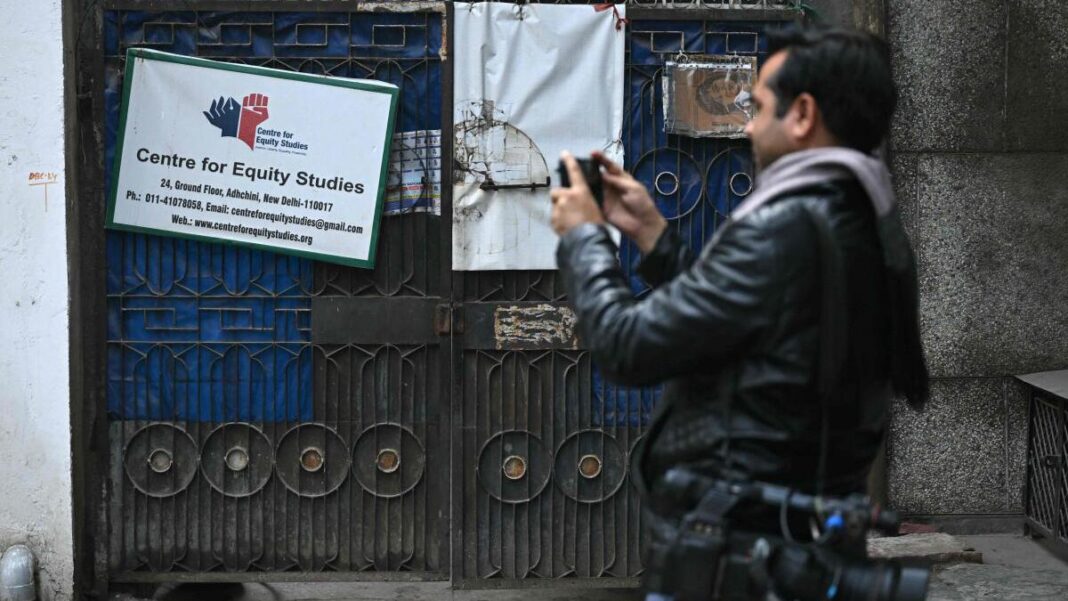
A media personnel takes photos of the office of ‘Centre for Equity Studies’ an advocacy outfit founded by activist Harsh Mander, after Central Bureau of Investigation (CBI) raided his offices allegdly over Foreign Contribution Regulation Act (FCRA) violation
Last week, the Central Bureau of Investigation (CBI) registered a case of alleged Foreign Contribution (Regulation) Act (FCRA) violation against human rights activist Harsh Mander and his NGO Centre for Equity Studies (CES). FIRs were registered based on a complaint from the Union Home Ministry. The agency allegedly found that the NGO transferred some amount to certain individuals from the FCRA account, apart from salary/wages/remuneration, which is a violation of the Act.
The action against CES is the latest incident in a series of measures against civil society and NGOs. Last month, FCRA registrations of Delhi-based Centre for Policy Research (CPR) and World Vision India were cancelled. In 2023, the Home Ministry had recommended a CBI investigation into Oxfam India for allegedly violating FCRA provisions. CBI also conducted searches and registered a case against news portal NewsClick for violating FCRA in December 2023.
The government uses FCRA to regulate the foreign funds received by NGOs “to prevent any possible diversion for activities detrimental to national interest.” Organisations have to compulsorily register under the Act if they wish to receive foreign funding. Over 20,000 FCRA licences have been cancelled till February 4.
Chart 1 shows that cancellations have spiked in certain years — 2012, 2015, 2017, 2019. Especially in 2015, over 10,000 cancellations were recorded. In other years, cancellations rarely crossed into the double digits. It is important to note that not all cancellations were due to violations, as many were also done to remove multiple registrations for the same organisation.
Chart 1 shows the year-wise break-up of cancellations.
Chart appears incomplete? Click to remove AMP mode
Cancellation of licences is not the only way in which organisations are denied foreign money. Changes in the law meant that FCRA registration is not permanent and needs renewal once in five years. Data from Lok Sabha show that 783 renewal applications were denied between 2019 and 2021.
Tamil Nadu leads the list with 2,580 FCRA licences of organisations registered in the State getting cancelled to date (Chart 2). Close to 1,576 licences expired in the State, also the highest among States. Notably, the State still has over 2,500 FCRA licences active, again the highest among States. Maharashtra, Andhra Pradesh, Uttar Pradesh, West Bengal and Karnataka are other States with a high number of cancellations. If cancellations are expressed as a share of all FCRA licences given, then Uttar Pradesh tops the list, with over 50% cancellations followed by Bihar, Andhra Pradesh, Odisha, Telangana and West Bengal with over 40% cancellations.
Chart 2 shows the State-wise number of active, expired and cancelled FCRA licences.
A break-up of organisations with an active FCRA licence shows that most of them are engaged in educational and social service, while religious NGOs — most dominated by those registered as Christian organisations — also form a significant share, as shown in Table 3.
Table 3 shows the break-up of organisations with an active FCRA licence.
While Tamil Nadu has the largest number of organisations with an active FCRA licence, they received the third highest amount (2,507 crore) of foreign contribution in this route in FY22 (Chart 4). Organisations registered in Delhi received ₹5,809 crore in the period, the highest among all States/UTs, followed by Karnataka (3,140 crore). Organisations in Gujarat and Telangana have received over ₹1,000 crore.
Chart 4 shows the State-wise foreign contribution received FY2021-22 (in ₹ crore)
Neetika Jha is a student at Asian College of Journalism
Source: Foreign Contribution (Regulation) Act portal and Rajya Sabha answers
Also read: Why was FCRA registration for several NGOs cancelled? | Explained
Published – February 09, 2024 04:07 pm IST




